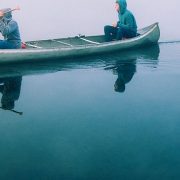Solo by Name, Solo by Nature?
Screenshot taken from Official Trailer
Rating: 3.5 out of 5
Written by Simon Moetara, New Zealand
When we first meet Han Solo in a seedy Mos Eisley bar on Tatooine in Episode IV: A New Hope, he’s a pirate and smuggler, cynical and smug, all swaggering braggadocio and cold-blooded ruthlessness. His dress presents him as a sci-fi take on the Old-West gunslinger, with a quick draw on both his blaster and his sardonic wit.
And Han is all about Han. Recall Solo’s self-regarding words to Princess Leia Organa in A New Hope: “Look, I ain’t in this for your revolution, and I’m not in it for you, Princess. I expect to be well paid. I’m in it for the money.” He’s also not used to playing nicely with others. Remember his stern rebuke to Leia: “Look, your worshipfulness, let’s get one thing straight. I take orders from just one person: me.”
However, Solo will go on a journey that will see his personality transformed. In the screenplay for A New Hope, Han Solo is described as “a loner who realizes the importance of being part of a group and helping for the common good.”
There is a history, a story, a lifetime of experiences and injuries that led Han Solo to become the sarcastic, self-interested adventurer we knew and loved in the original trilogy. In Solo: A Star Wars Story (2018), director Ron Howard looks to explore this mythology behind the Star Wars universe’s most loveable rogue, and the tension between his cynical isolation and his deep need to belong.
Early on in Solo, Han looks to join the Galactic Empire in order to escape his poverty (and a group of pursuing bad guys). During recruitment, an Imperial security officer asks Han for his last name. When Han is silent, the officer asks, “Who are your people?” Han responds, “I don’t have people. I’m alone.” The officer then enters “Solo” as his family name, a name he takes on for the rest of the saga.
Solo spends the rest of the film trying to connect with others: a past love from his days as a thief in Corellia; with a band (really, a family) of outlaws led by surrogate father-figure Tobias Beckett (Woody Harrelson); and, of course, with his eventual partner of many decades, the Wookie, Chewbacca.
However, Solo experiences all manner of betrayal and duplicity. One character even warns Solo, “If you don’t trust anyone, you’ll never be disappointed.” Because, as writer Sarah Welch puts it, trust means vulnerability, and vulnerability means exposure to betrayal.
But, as Christian scholar C. S. Lewis writes in his classic work The Four Loves, to love at all is to be vulnerable.
Love anything and your heart will be wrung and possibly broken. If you want to make sure of keeping it intact you must give it to no one, not even an animal… avoid all entanglements. Lock it up safe in the casket or coffin of your selfishness. But in that casket, safe, dark, motionless, airless, it will change. It will not be broken; it will become unbreakable, impenetrable, irredeemable.
For Lewis—as for us—love means opening our hearts to the possibility of hurt and sorrow. As author Courtney Reissig points out, the only alternative would be to live without love—to be alone forever.
This is the challenge set before Solo. In the face of the cruelty and betrayal of a fallen and broken world, will he continue down a path of self-preservation, safe from hurt and wrapped in his ruthless pragmatism and self-serving cynicism? Or can he risk his heart for others, daring to love?
The one person he truly connects with is his seven-foot companion, Chewbacca. Forced together in captivity, and even chained together, their loyalty and friendship of many decades will grow. C. S. Lewis speaks of the love of friendship as being, “born at the moment when one man says to another ‘What! You too? I thought that no one but myself…’”
Chewbacca is alone and forlorn, looking for his family or tribe; Han is likewise alone and forsaken, yearning to belong. Together they find solace in the presence and companionship of one another, and will ultimately journey towards commitment to a cause far greater than themselves.
In her book The Gifts of Imperfection, Brene Brown notes that, “A deep sense of love and belonging is an irreducible need of all men, women and children.” Brown continues:
We are biologically, cognitively, physically, and spiritually wired to love, be loved, and to belong. When those needs are not met, we don’t function as were meant to be. We break. We fall apart. We numb. We ache. We hurt others. We get sick… The absence of love and belonging will always lead to suffering.
Solo: A Star Wars Story (2018) reminds us of that same truth: we weren’t meant to do life alone. We’re not made for it. As human beings created in the image of the triune God, we were created to belong. We were made to love and to be loved and to belong. We were created for community.
Christian writer Philip Yancey says, “Christianity is not a purely intellectual, internal faith. It can only be lived in community.” In Acts 2:42 we read that the early church devoted themselves, among many things, “to fellowship,” to koinonia. The Message translation states that they committed themselves to “the life together.”
God wants us to know we’re loved. He wants us to have a sense of belonging. To belong to His people, and to find our identity in Him as people who are deeply loved. And to commit ourselves to the life together, under His guidance and grace.










Leave a Reply
Want to join the discussion?Feel free to contribute!